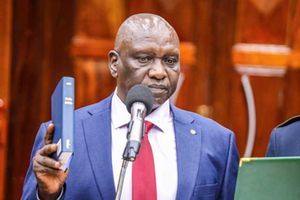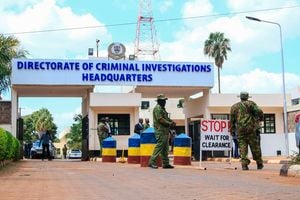
Inspector-General of the National Police Service Douglas Kanja.
As soon as you emerge from the VIP lift, the velvet red carpet leading to the corner office at Jogoo House welcomes you to the office of Inspector-General of Police Douglas Kanja.
At the main entrance, uniformed officers from the IG's protocol department stand ready to escort you into the police chief's office.
Before being cleared, one must fill in their details, which include name, cell phone number and purpose of the visit. This is the protocol for all visitors to the IG's office, except for senior uniformed police officers.
After completing the registration process, the visitor is directed to the VIP waiting room on the fourth floor of Jogoo House. Only people who have an appointment and have been vetted and cleared by IG security are allowed to enter this room.
Visitors without an appointment must speak with the IG's personal assistant, who will deal with their issues.
On this day, Nation.Africa had booked an appointment with the IG for an interview on, among other things, his agenda for the National Police Service. It took us less than 10 minutes before we were ushered into Mr Kanja's office.
In his office, Mr Kanja, a soft-spoken police chief, welcomed us to the NPS headquarters.
It is from this office that four predecessors have made all the major security decisions in the country. Mr Kanja is the fifth Inspector-General of Police since the position was created by the new Constitution in 2010.
Huge task
Almost a month and a half after taking over from Mr Japhet Koome, Mr Kanja has a to-do list. He admits that the task ahead of him is huge.
“Unlike other professions, policing duties are difficult and waves of crime are unpredictable but having been around for a while I’m equal to the task “he said.
He reveals that fighting drug cartels, the brewing of illicit alcohol and improving service delivery in the police service are his top priorities as IG.
So far, he says he has started implementing some of the recommendations by former chief justice David Maraga-led taskforce that will transform the police service.
Among the quick wins for Kanja is to improve service delivery by the police. The IG revealed that he has so far trained 700 police officers in the rank of Chief Inspector of Police who have been deployed to be station commanders.
These officers, named Ideal OCS, have undergone special training including human rights and public relations. The IG is banking on these officers to drive change in police stations across the country.
“We want to bring in a new culture in the police where the customers get the right services at the police station. If the officers at the station are able to discharge their mandate well, they need the public to seek higher interventions on matters that can be resolved at the station level,” Mr Kanja said.
It is the issue of dealing with drug cartels and the brewing of illicit alcohol that the IG is currently focusing on.
Keen to succeed where his predecessors have failed, he revealed that he is in the process of elevating the DCI anti-narcotic unit into a fully-fledged unit of the National Police.
In his attempt to deal with the drug lords, Mr Kanja has proposed that the Anti-narcotics Unit be upgraded to the same level as the Anti-terrorism Police Unit with a commandant under the direct supervision of the DCI boss or the DIG in charge of the Kenya Police.
Officers who will be trained on narcotics investigations will then be deployed to this rebranded unit to deal with the drug cartels and illicit brewers.
“Drugs and illicit alcohol pose a serious threat to the current and future generations,” he said.
This is not the first time that the National Police Service is attempting to crush drug cartels.
In 2010, Cabinet Minister Prof. George Saitoti, who was in charge of the internal security portfolio in Parliament, named high-ranking individuals linked to drug trafficking.
The list included four Members of Parliament and a businessman whose involvement in drugs had been revealed in a dossier presented to the government by the US government.
Some of the individuals named in the dossier are now high-ranking officials in the national and county governments.
To date, not much has come out of the investigations following the release of the names by Prof Saitoti.
Asked about this situation, Kanja said: “Watch this space.”
The IG believes that through community policing, his administration will get all the information on drug dealers. He says he will also expand the community policing unit and make it more effective.
Since taking over as the IG, the police have also come under the spotlight following a string of murders witnessed in the country lately. Police statistics reveal that cases of murder have risen this year compared to the previous years.
In a statement released last Friday, Mr Kanja said under his watch, the police are committed to uncovering the murders.
According to the IG, 339 cases of murder have been reported in the country so far compared to 336 cases reported in the same period last year. In 2022, 341 cases of murder were reported to the police countrywide.
The most recent cases of gruesome murders to be reported include the gory murder of Wells Fargo HR Manager Willis Ayieko who was brutally murdered by unknown people last week.
Ayieko was reported missing last Friday after attending a funeral vigil in Nyamninia, Siaya County.
His orange pick-up truck was later found abandoned near a petrol station in Sabatia, Vihiga County which is just a few kilometres from where his body was found.
Ayieko’s body was found floating in a river at Doho village, in Gem a few days after he went missing.
Days after DCI Homicide detectives were dispatched to Nyanza for the investigations, other shocking murders were reported in Nairobi involving three family members who went missing from Eastleigh before their bodies were found dumped in different parts.
In an update on the investigations on Thursday, he revealed that detectives have recovered a motor vehicle believed to have been used in the abduction of the three family members who went missing from Eastleigh before their bodies were found.
The vehicle was recovered at Ukulima Market in Kamukunji, Nairobi.
A witness with crucial information about the murder is also being questioned by the police.
Police said investigations have revealed that after the three were killed, the suspect dumped their bodies in different locations.
Nuseiba Abdi's body was left in Bahati, while Amina Abdirashid's body was dumped in Parklands.
After leaving Parklands, the suspect reportedly picked up another woman along City Road before heading to South C, where they dumped the severed hands of Warris Daud.
The killers proceeded to Kyumbi, Machakos County, where the body of Warris Daud was abandoned.
Investigators are analysing CCTV footage and payment details from a petrol station where the suspect fuelled the vehicle during this journey.












